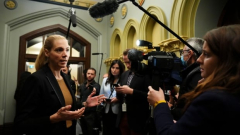PROVIDENCE, R.I. — President Donald Trump’s pick to be the next U.S. surgeon general has repeatedly said the nation’s medical, health and food systems are corrupted by special interests and people out to make a profit at the expense of Americans’ health.
Yet as Dr. Casey Means has criticized scientists, medical schools and regulators for taking money from the food and pharmaceutical industries, she has promoted dozens of health and wellness products — including specialty basil seed supplements, a blood testing service and a prepared meal delivery service — in ways that put money in her own pocket.
A review by The Associated Press found Means, who has carved out a niche in the wellness industry, set up deals with an array of businesses.
In her newsletter, on her social media accounts, on her website, in her book and during podcast appearances, the entrepreneur and influencer has at times failed to disclose that she could profit or benefit in other ways from sales of products she recommends. In some cases, she promoted companies in which she was an investor or adviser without consistently disclosing the connection, the AP found.
Means, 37, has said she recommends products that she has personally vetted and uses herself. She is far from the only online creator who doesn’t always follow federal transparency rules that require influencers to disclose when they have a “material connection” to a product they promote.
Still, legal and ethics experts said those business entanglements raise concerns about conflicting interests for an aspiring surgeon general, a role responsible for giving Americans the best scientific information on how to improve their health.
“I fear that she will be cultivating her next employers and her next sponsors or business partners while in office,” said Jeff Hauser, executive director of the Revolving Door Project, a progressive ethics watchdog monitoring executive branch appointees.
The nomination, which comes amid a whirlwind of Trump administration actions to dismantle the government’s public integrity guardrails, also has raised questions about whether Levels, a company Means co-founded that sells subscriptions for devices that continuously monitor users’ glucose levels, could benefit from this administration’s health guidance and policy.
Though scientists debate whether continuous glucose monitors are beneficial for people without diabetes, U.S. Health Secretary Robert F. Kennedy Jr. has promoted their use as a precursor to making certain weight-loss drugs available to patients.
The aspiring presidential appointee has built her own brand in part by criticizing doctors, scientists and government officials for being “bought off” or “corrupt” because of ties to industry.
Means’ use of affiliate marketing and other methods of making money from her recommendations for supplements, medical tests and other health and dietary products raise questions about the extent to which she is influenced by a different set of special interests: those of the wellness industry.
Means earned her medical degree from Stanford University, but she dropped out of her residency program in Oregon in 2018, and her license to practice is inactive. She has grown her public profile in part with a compelling origin story that seeks to explain why she left her residency and conventional medicine.
“During my training as a surgeon, I saw how broken and exploitative the healthcare system is and left to focus on how to keep people out of the operating room,” she wrote on her website.
Means turned to alternative approaches to address what she has described as widespread metabolic dysfunction driven largely by poor nutrition and an overabundance of ultra-processed foods. She co-founded Levels, a nutrition, sleep and exercise-tracking app that can also give users insights from blood tests and continuous glucose monitors. The company charges $199 per year for an app subscription and an additional $184 per month for glucose monitors.
Means has argued that the medical system is incentivized not to look at the root causes of illness but instead to maintain profits by keeping patients sick and coming back for more prescription drugs and procedures.
“At the highest level of our medical institutions, there are conflicts of interest and corruption that are actually making the science that we’re getting not as accurate and not as clean as we’d want it,” she said on Megyn Kelly’s podcast last year.
But even as Means decries the influence of money on science and medicine, she has made her own deals with business interests.
During the same Megyn Kelly podcast, Means mentioned a frozen prepared food brand, Daily Harvest. She promoted that brand in a book she published last year. What she didn’t mention in either instance: Means had a business relationship with Daily H





